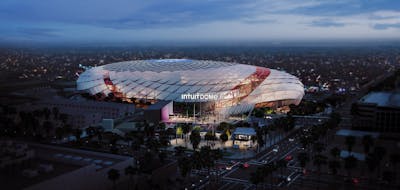
loanDepot Park Retractable Roof
Resilient, sustainable stadiums
Project Facts
| Location | Miami, Florida |
| Owner | Miami Marlins |
| Size | 300,000 SF |
| Cost | $600 million |
| Status | Completed 2012 |
| Capacity | 37,000 seats |
| Certifications | LEED Gold |
Overview
Nestled in the south Florida neighborhood known as “Little Havana,” the $515 million, 37,000-seat loanDepot (formerly Marlins) Park is a meticulously engineered piece of art. The stadium has the largest retractable roof in major league sports, covering a staggering 7.7 acres. This three-panel, 8,000-ton steel roof can open or close in just 13 minutes, allowing fans to enjoy games in the open air or seek shelter from Miami’s unpredictable weather. This smart design is a marvel of engineering, built to withstand hurricane conditions. Astoundingly, opening or closing the roof costs less than $10, making it both an environmental and economic achievement.
Services
About the Project
This ballpark marks our sixth retractable roof stadium and our second for Major League Baseball after Houston’s Daikin Park (formerly Minute Maid Park). We engineered this latest generation of retractable roofs to be hurricane resistant, energy efficient to operate, and to give a thoroughly modern, dispensable cap to a thoroughly modern ballpark. Both the stadium and roof are unlike anything else in Major League Baseball.
Miami’s tropical climate posed unique challenges for this project. Hurricanes, sweltering heat, and occasional downpours demanded a roof that could withstand it all. The three-panel roof spans between 530 and 560 feet over the playing field and moves atop a giant concrete column frame, providing shade and eliminating costly rainouts. The panels operate independently, offering hurricane resistance and energy efficiency. They nest together when fully open, and the deliberate spacing between them prevents pressure buildup during high winds. This clever design not only enhances safety but also saves $5 million in construction costs.
The completion of loanDepot Park represents a leap forward in the engineering of professional stadia. Among its achievements, the ballpark is the first retractable roof facility to garner LEED Gold certification. From the first foundation to the highest roof truss, this ballpark represents a wildly successful project—one in which innovative engineering solutions contributed to a facility completed on time and on budget, which has exceeded all expectations from the owner and re-invigorated fans.
Advancing Hurricane Engineering
The varying heights of the roof panels, spanning from 128 feet to 210 feet, were meticulously calculated to ensure they didn’t interfere with fly balls, maintaining the integrity of the game. These complex calculations included data from NASA and a custom algorithm to determine the roof’s final geometry.
Walter P Moore collaborated on this design with mechanization consultant Uni-Systems, who provided mechanization design and supply. The team innovated to reduce the roof cost by $4 million and eliminated costly weather seals between the roof panels altogether. By carefully evaluating the performance of the roof in the severe hurricanes that frequent South Florida, Walter P Moore designed the roof to survive the hurricane with the roof panels in a slightly open, or “gapped” position. This simple but groundbreaking departure from the tightly sealed roof storm strategies of other retractable-roof venues in hurricane zones yielded savings of over 1,000 tons of steel in the 8,000-ton roof.
Owner Jerry Loria was committed to sustainability, aiming for a minimum LEED Silver certification. However, loanDepot Park exceeded expectations by achieving a Gold rating. The retractable roof played a crucial role in this accomplishment. Its regenerative drive systems recycle excess power generated during operation, returning it to the electrical grid.
loanDepot Park isn’t just a stadium; it’s a testament to innovation, resilience, and sustainability. Its one-of-a-kind three-panel moving roof has become the signature architectural feature of the park and is a symbol of Miami’s forward-looking spirit.




